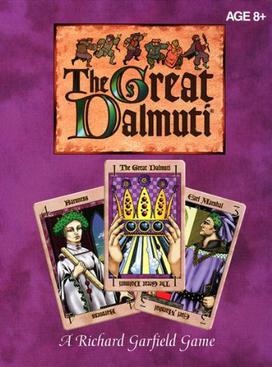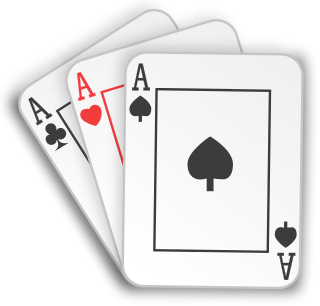This article needs additional citations for verification .(November 2021) |

Career Poker is a card game originally published in Germany as Karriere Poker in 1988 by Hexagames.
This article needs additional citations for verification .(November 2021) |

Career Poker is a card game originally published in Germany as Karriere Poker in 1988 by Hexagames.
Career Poker is a hierarchical card shedding game for 4–8 players in which players try to become the company boss and avoid becoming the dishwasher. [1] The game uses a deck with 8 suits of 13 cards each and four wild cards. The wild cards can be used as any rank; if played without any normal cards, the wild card counts as the highest card in the deck.
The deck is shuffled, and 13 cards are dealt to each player. The first player leads any single card or set of cards that are identical (two 7s, three 10s, etc.), and can use one or more wild cards to complete a set. The next player to the left may either pass or raise. In order to raise, the player must lay down the same number of matching cards as the first player laid down, but they must be higher in rank. The next player has the same option of pass or raise, but this time, the cards must be higher than the second player's. Play continues until all players pass. The cards on the table are discarded, and the player who successfully played the highest card or set of cards leads to start the next round. [1]
Example: In a five-player game, the first player lays down three 7s. The second player does not have three matching cards and passes. The third player raises with two 9s and a wild card. The fourth player has three 8s, but these are lower than three 9s, and is forced to pass. The fifth player raises with a 10 and two wild cards. No one has three cards higher than this, ending the round. The lead for the next round passes to the fifth player, who played the highest cards in the first round.
The first person who gets rid of all their cards becomes the Boss. The second player becomes the Business Executive, the third becomes the Manager, and so on. The last player holding cards in their hand becomes the Dishwasher. Seating is rearranged so that the players are seated in clockwise order according to their company ranking from the Boss down to the Dishwasher. The Dishwasher (seated to the left of the President), shuffles and deals the cards again. Before play begins, the lowest ranked players must give the highest ranked players their best cards, and in return, they receive the highest ranked players' worst cards. [1] How many players are playing determines who swaps cards with whom, and how many cards are swapped.
Play now continues for another hand. At the end of the hand, seating order is rearranged again.
The game can continue indefinitely or until a predetermined condition is reached such as a time limit, a set number of hands, or the same player becomes Boss for a certain number of consecutive hands.
Hexagames published Karriere Poker in Germany in 1988, and it has been republished under a variety of names and languages: [2]
Brian Walker reviewed Karriere Poker for Games International magazine, and gave it a very good rating of 4 stars out of 5, stating "Of course you can play the game for fun, and of that there is plenty, provided you're not doing the washing up." [1]
Writing for WIN Spiele, Dagmar de Cassan reviewed a new edition titled Hollywood Poker and noted, "The new edition of Karriere Poker has changed a bit thematically and graphically, but the fun of the game is the same [...] From dishwasher to millionaire and back to dishwasher is a typical career path." [3]

Poker is a family of comparing card games in which players wager over which hand is best according to that specific game's rules. It is played worldwide, but in some places the rules may vary. While the earliest known form of the game was played with just 20 cards, today it is usually played with a standard deck, although in countries where short packs are common, it may be played with 32, 40 or 48 cards. Thus poker games vary in deck configuration, the number of cards in play, the number dealt face up or face down, and the number shared by all players, but all have rules that involve one or more rounds of betting.
A stripped deck or short deck (US), short pack or shortened pack (UK), is a set of playing cards reduced in size from a full pack or deck by the removal of a certain card or cards. The removed cards are usually pip cards, but can also be court cards or Tarot cards. Many card games use stripped decks, and stripped decks for popular games are commercially available.
Five-card stud is the earliest form of the card game stud poker, originating during the American Civil War, but is less commonly played today than many other more popular poker games. It is still a popular game in parts of the world, especially in Finland where a specific variant of five-card stud called Sökö is played. The word sökö is also used for checking in Finland.
Seven-card stud, also known as Seven-Toed Pete or Down-The-River, is a variant of stud poker. Before the 2000s surge of popularity of Texas hold 'em, seven-card stud was one of the most widely played poker variants in home games across the United States and in casinos in the eastern part of the country. Although seven-card stud is not as common in casinos today, it is still played online. The game is commonly played with two to eight players; however, eight may require special rules for the last cards dealt if no players fold. Playing with nine players is possible.

Texas hold 'em is one of the most popular variants of the card game of poker. Two cards, known as hole cards, are dealt face down to each player, and then five community cards are dealt face up in three stages. The stages consist of a series of three cards, later an additional single card, and a final card. Each player seeks the best five-card poker hand from any combination of the seven cards: the five community cards and their two hole cards. Players have betting options to check, call, raise, or fold. Rounds of betting take place before the flop is dealt and after each subsequent deal. The player who has the best hand and has not folded by the end of all betting rounds wins all of the money bet for the hand, known as the pot. In certain situations, a "split pot" or "tie" can occur when two players have hands of equivalent value. This is also called "chop the pot". Texas hold 'em is also the H game featured in HORSE and HOSE.

Brag is an 18th century British card game, and the British national representative of the vying or "bluffing" family of gambling games. It is a descendant of the Elizabethan game of Primero and one of the several ancestors to poker, the modern version just varying in betting style and hand rankings. It has been described as the "longest-standing British representative of the Poker family."

Big two is a card game of Cantonese origin. The game is popular in East Asia and in Southeast Asia, especially throughout mainland China, Hong Kong, Vietnam, Macau, Taiwan, Indonesia, the Philippines, Malaysia and Singapore. It is played both casually and as a gambling game. It is usually played with two to four players. The objective of the game is to be the first to play off all of one's cards.
Non-standard poker hands are hands which are not recognized by official poker rules but are made by house rules. Non-standard hands usually appear in games using wild cards or bugs. Other terms for nonstandard hands are special hands or freak hands. Because the hands are defined by house rules, the composition and ranking of these hands is subject to variation. Any player participating in a game with non-standard hands should be sure to determine the exact rules of the game before play begins.
Razz is a form of stud poker that is normally played for ace-to-five low. It is one of the oldest forms of poker, and has been played since the start of the 20th century. It emerged around the time people started using the 52-card deck instead of 20 for poker.
Macau, also spelled Makaua or Macaua, is a shedding-type card game from Hungary, with similar rules to Crazy Eights or Uno and uses a standard 52 card deck. The object of the game is to be the first player to remove all cards from one's hand. Macau involves bluffing so that the players can save cards for later for a higher point value. Cheating is encouraged to add additional gameplay depth.

Truco, a variant of Truc, is a trick-taking card game originally from Valencia and the Balearic Islands, popular in South America and Italy. It is usually played using a Spanish deck. Two people may play, or two teams of two or three players each.

The Great Dalmuti is a shedding-type card game published by Wizards of the Coast in February 1995.

Daifugō or Daihinmin, also known as Tycoon, is a Japanese shedding-type card game for three or more players played with a standard 52-card pack. The objective of the game is to get rid of all the cards one has as fast as possible by playing progressively stronger cards than those of the previous player. The winner is called the daifugō earning various advantages in the next round, and the last person is called the daihinmin. In that following round, winners can exchange their one or more unnecessary cards for advantageous ones that losers have.

Teen patti is a gambling card game. Teen Patti originated in India and is popular throughout South Asia. It originated in the English game of three-card brag, with influences from poker. It is also called flush or flash in some areas.
The following is a glossary of poker terms used in the card game of poker. It supplements the glossary of card game terms. Besides the terms listed here, there are thousands of common and uncommon poker slang terms. This is not intended to be a formal dictionary; precise usage details and multiple closely related senses are omitted here in favor of concise treatment of the basics.
Stud poker is any of a number of poker variants in which each player receives a mix of face-down and face-up cards dealt in multiple betting rounds. Stud games are also typically non-positional games, meaning that the player who bets first on each round may change from round to round. The cards dealt face down to each individual player are called hole cards, which gave rise to the common English expression ace in the hole for any hidden advantage.
Draw poker is any poker variant in which each player is dealt a complete hand before the first betting round, and then develops the hand for later rounds by replacing, or "drawing", cards.
Wild escape, also known as daguai luzi or the joker's way is a card game originating in Shanghai, China. It is a team game for 6 players and played with three decks of cards.

1000 is an easy-to-learn card game for two or three players. Its simple rules make it suitable for players to quickly become familiar with the basic concepts of trick-taking and trump-based card games. The name is taken from the score at the end of the game.